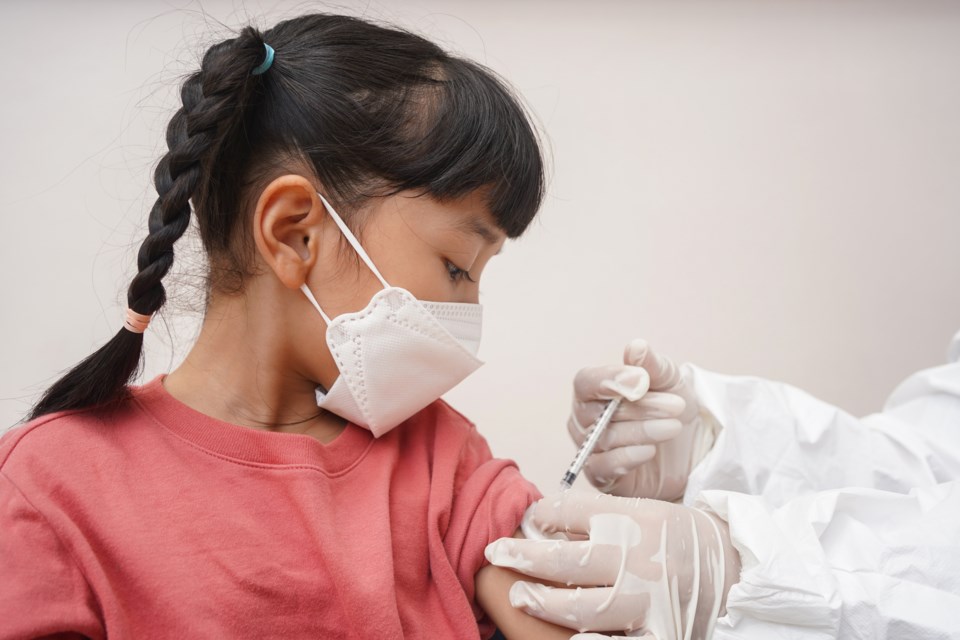As 2022 draws to a close, we’re looking back at the top 10 New Westminster news stories of the year.
Yesterday, we brought you a reminder of the New Westminster school district’s ongoing space crisis and the impact it’s having on the community as the board is forced to make tough decisions about how to use school space.
Today, we’re looking at number 5, with another issue that isn’t about to end any time soon: COVID-19.
From Omicron to a kids’ health-care crisis: Looking back at a pandemic year
The year began in New Westminster, as it did across B.C. and far beyond, with the rise of yet another variant: Omicron.
Before we’d all even learned how to pronounce yet another letter of the Greek alphabet, the latest evolution of SARS-CoV-2 was already wreaking havoc. COVID testing capabilities collapsed under the weight of the highly transmissible new variant, and it quickly became impossible to know just how many cases there really were anywhere.
The New Westminster school district saw students return to school in January amidst the uncertainty of the massive Omicron wave, and SD40 quickly put plans in place to cope.
In January, the district put HEPA filtration units into place in all its portables, plus the two school sites that weren’t capable of running MERV-13 filters: the old Skwo:wech Elementary School (replaced with a shiny new facility in March) and the leased space at Columbia Square that houses the RCAP and POWER alternate programs. (The move came months after a push by parents in September 2021 to have HEPA filtration units in classrooms; at that time, the district had said they were not needed.)
With students back in class and Omicron rising, the district also laid out its plans for “functional closures” — the B.C. government’s term for school shutdowns if too many staff members were absent at one time — and sent home rapid antigen test kits with students as part of a B.C.-wide push to get RATs into the hands of all K-12 students.
Free rapid antigen test kits became available to New West residents at pharmacies across the city.
After that, the year saw COVID-19 begin to fade — somewhat — from the headlines, as it was no longer possible to track how many local cases of the virus there were, nor what impact it was having in local schools and workplaces.
Heading into the new school year in September — the fourth school year to be affected by the COVID-19 pandemic — New West students returned to the most “normal” year since the rise of COVID, with no mask mandates, restrictions on gatherings or other COVID-era precautions in place.
The Protect Our Province B.C. coalition, including New Westminster’s Dr. Lyne Filiatrault, a former ER physician, called on the province to get serious about COVID-19 in schools to stem the tide of COVID in children, highlighting the impacts of long COVID on children in B.C. and beyond.
The B.C. government continued to stress vaccination as key to coping with the pandemic.
The COVID-19 vaccine campaign continued throughout the year, with some bumps along the way — including a glitch that caused a delay in rolling out kids’ booster shots before the start of the new school year.
Despite the hiccups, New Westminster remained a vaccination leader in B.C., consistently posting vaccination rates that were the highest or near-highest in the Fraser Health region. Rates amongst children, however, remained low: as of Dec. 4, just 13 per cent of the youngest children (aged 0-4) had received their second dose of vaccine, and just 25 per cent of five-to-11-year-olds had received their boosters.
To complicate matters, heading into the late fall and winter, a new health-care crisis loomed: a “tripledemic” of respiratory illness in children. The province saw the return of RSV, followed by a spike in influenza-A that has driven up ER visits and hospitalizations to record levels and claimed the lives of six British Columbian children (as of Dec. 15).
In response, the Ministry of Health launched a vaccination blitz in early December encouraging families to get their children vaccinated for flu, too. The blitz had some effect, bringing immunization rates up slightly, but around three-quarters of B.C. children still remained unprotected.
Heading into the holiday season, the surge of respiratory illness showed no signs of abating, and hospitals around B.C. were feeling the strain.
With influenza surging and COVID-19 still in play, one thing is clear: The pandemic, in all its many facets, isn’t going anywhere soon.
Follow Julie MacLellan on Twitter @juliemaclellan.
Email Julie, [email protected]



